
Vietnam was one of the 14 countries elected by the United Nations (UN) General Assembly to the UN Human Rights Council (UNHRC) for the 2023-2025 term on October 11, 2022. This is the fruit of tireless efforts made by the nation’s Party and State in taking care of its people and protecting human rights with many favourable policies to ensure people’s comprehensive development and leave no one behind. The efforts have been recognised and praised by the international community.
Perfecting policies, laws to promote human rights
With the message of “Mutual Respect, Dialogue and Cooperation, Ensuring All Human Rights, for All” for its three-year membership at the UNHRC, Vietnam is sure to directly contribute to protecting and promoting human rights worldwide – a main task of the United Nations.
Putting the people at the centre of development has been a consistent strategic orientation and a thorough action philosophy of Vietnam throughout the millennia-long history of its national construction and defence, and the present cause of national construction and development.
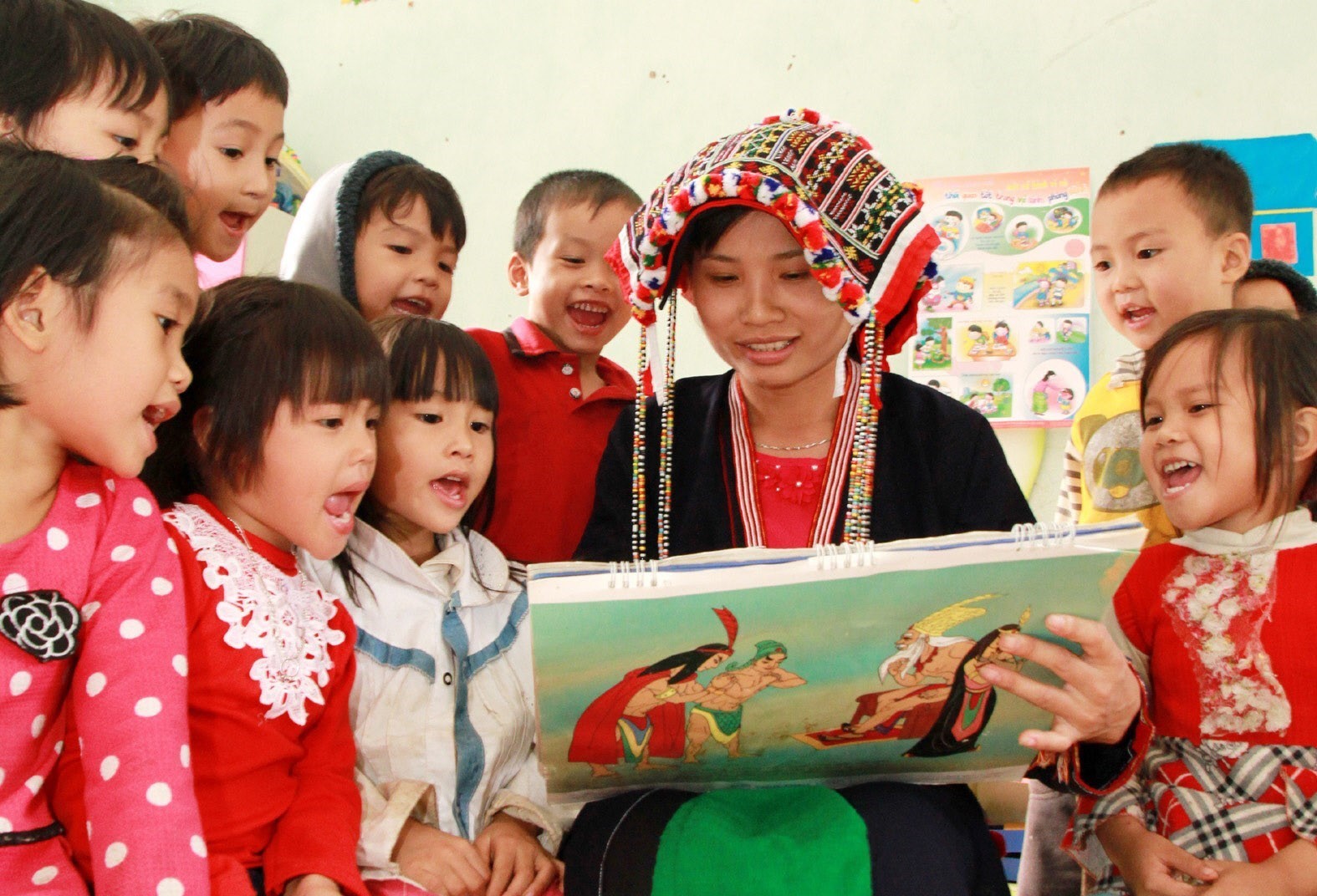
The documents adopted at all National Congresses of the Communist Party of Vietnam have so far affirmed that the people are the most precious resource and caring for their happiness is the highest target of the regime.
Most recently, the Resolution of the 13th National Party Congress, adopted in 2021, again asserted the Party and State’s consistent policy on guaranteeing and promoting human rights, in which people are both the centre and the key players. This was both enshrined in the 2013 Constitution and many other relevant legal documents, and has also been reflected through the country’s efforts in guaranteeing and promoting fundamental human rights on politics, economy, and culture, among others, as well as in ensuring gender equality and protecting vulnerable groups in society.
Notably, to better ensure rights of vulnerable groups, including women, children and persons with disabilities (PwDs), many national action programmes have been launched. They include a programme supporting people with disabilities for 2021-2030, a national strategy on gender equality for 2021-2030, a programme to protect children online and an action programme for children in 2021-2030, and a programme on fighting human trafficking in 2021-2025, with a vision towards 2030.
Vietnam has rolled out the Law on Gender Equality and the Law on Persons with Disabilities, and is working hard to consolidate the legal system in this regard.
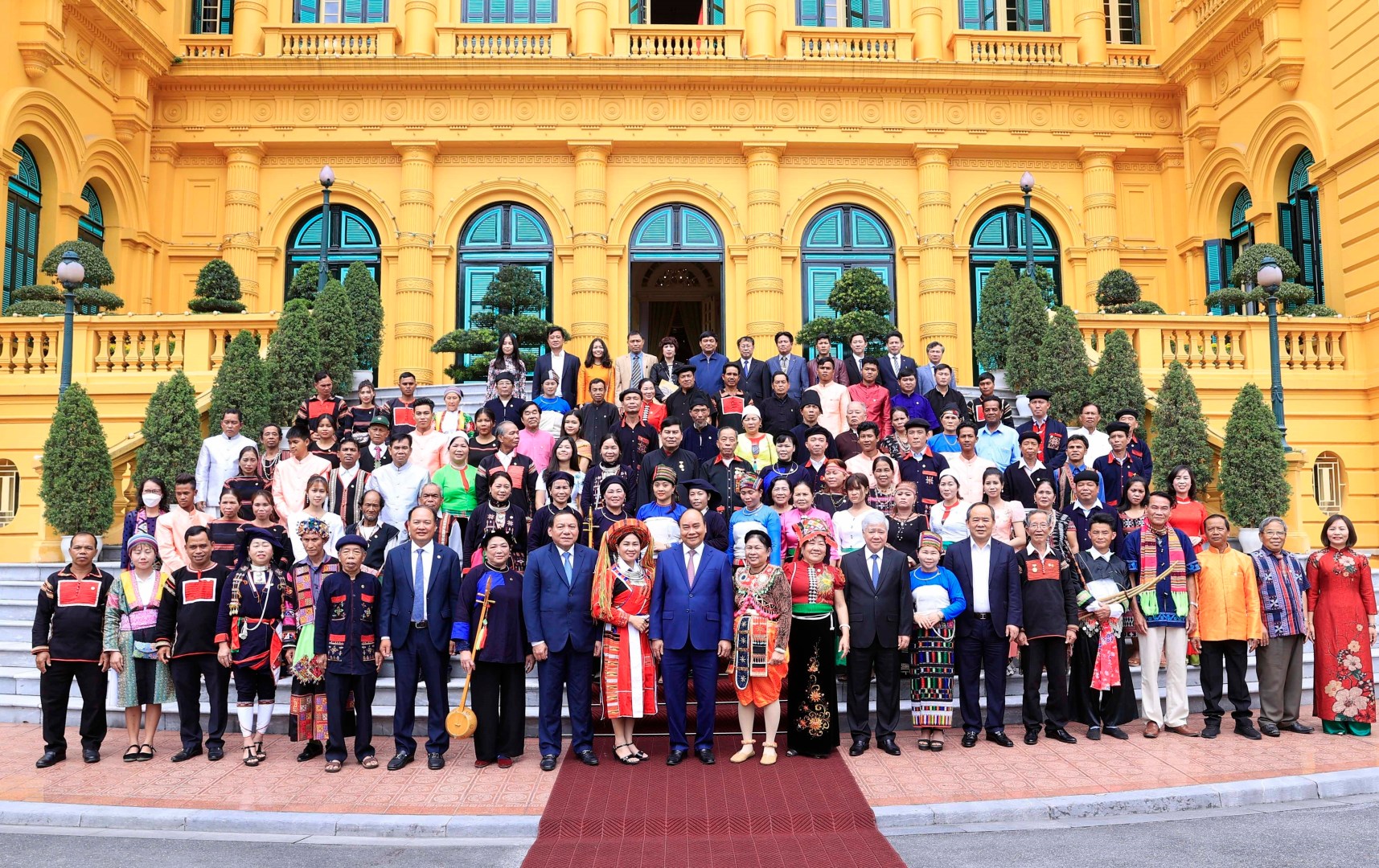
Besides, the Vietnamese Party, State and political system have worked hard to ensure that no one is left behind, particularly during the COVID-19 pandemic outbreak.
Over the past two years, the Government has issued two aid packages, one worth 62 trillion VND (2.73 billion USD) in 2020 and another valued at 26 trillion VND in 2021, which targeted those affected by the pandemic, including labourers, poor households, children, pregnant women, women with small children and social policy beneficiaries.
Regarding religion and belief, as a country with religious and belief diversity, its Party and State have always pursued a consistent policy of respecting and ensuring the right to freedom of belief and religion, and promoting good cultural and moral values and resources of religions in service of national development.
Thanks to the care of the Party and State, religious organisations in Vietnam have carried forward the traditions of patriotism and great national solidarity, followed the motto of leading both good religious and secular life, and accompanied the nation, significantly contributing to national construction and defence.
Deputy Minister of Home Affairs Vu Chien Thang stressed in one of his writings that religions have never had such favourable conditions for their activities in Vietnam like now.
Thang noted respecting the freedom of belief and religion is a consistent policy of the Vietnamese Party and State and has been institutionalised in the legal system, as it is one of the fundamental rights of the people and enshrined in the Constitution from the 1946 version to the 2013 one.
Inheriting late President Ho Chi Minh’s viewpoint and thought on religion, in each period of the revolution, the Party and State have issued many guidelines, policies, and laws on belief, religion, ensuring the freedom to belief and religion, creating a legal foundation for religions to be practiced stably and enhancing the relations between the State and religious organisations.
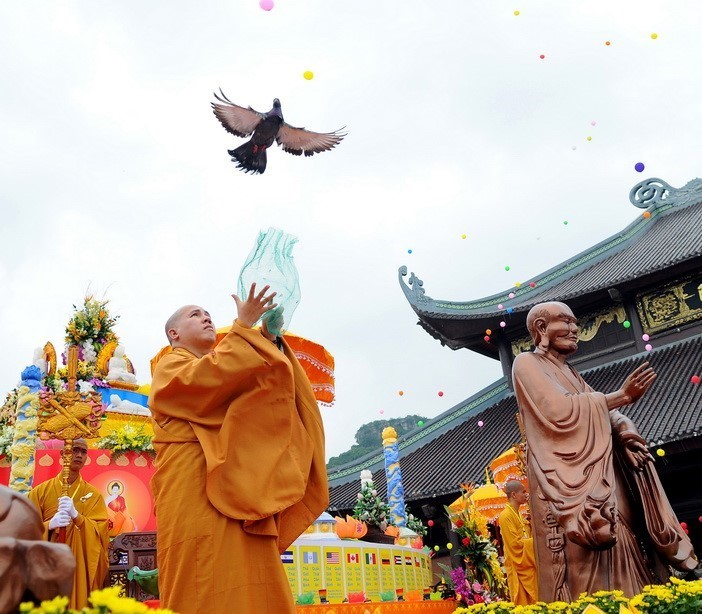
Since the Party Central Committee’s Resolution No 25-NQ/TW, issued on March 12, 2003, on religious affairs in the new context, more than 30 legal documents related to belief and religion have been issued, reflecting the State’s attention to people’s legitimate belief and religious demand.
Thang said thanks to religion-related guidelines, policies, and laws, the numbers of religious dignitaries, followers, and places of worship have been on the rise; and people’s right to the freedom of belief and religion better ensured.
Vietnam is currently State party to seven out of nine key international human rights treaties and 25 conventions of the International Labour Organisation
According to the Government Committee for Religious Affairs, the State has recognised and licensed 43 organisations belonging to 16 religions with about 26.5 million followers, making up 27% of the national population, of which over 54,000 are dignitaries, along with nearly 30,000 worship places.
Furthermore, Vietnam also attaches great importance to the adherence to, and implementation of international treaties in protecting and promoting human rights in the country.
Vietnam is currently State party to seven out of nine key international human rights treaties and 25 conventions of the International Labour Organisation (ILO). A roadmap has been set for future ratification of ILO Convention No. 87 on Freedom of Association and Protection of the Right to Organise.
Vietnam abides by its obligations under international human rights treaties to which it is a party, including that of reporting on their implementation in the country.
Tireless efforts in all circumstances
Considering the protection and promotion of human rights as a focal point of the country in any circumstances, Vietnam has exerted numerous efforts to care for the people, especially disadvantaged groups, including ethnic minorities and persons with disabilities, even in toughest time when Vietnam, a developing country was struggling with economic difficulties and challenges from the COVID-19 pandemic.
Throughout the national development process, the Vietnamese Party and State have consistently paid attention to ethnic issues and promoted equality between ethnic groups to ensure national unity.
Ensuring the right to education for ethnic minorities is a fundamental goal of Vietnam’s development policy. The Party and State always give priority to education in remote, mountainous and ethnic-inhabited areas, and islands.
By 2020, the literacy rate of ethnic minorities reached 90%, and the percentage of children going to school at the right age at all levels of education has been on the rise. These are remarkable achievements because ethnic-inhabited and mountainous areas account for nearly three quarters of the country’s natural area and are home to 53 ethnic minorities with 14.12 million people, making up 14.7% of the total population.
Special attention has been paid to education and training as well as improving the quality of human resources for ethnic minorities. Currently, there are 316 boarding schools for ethnic minorities in 49 provinces and cities nationwide, with incentive policies to support their training. More than 800,000 ethnic minority people received vocational training in the 2016-2020 period.
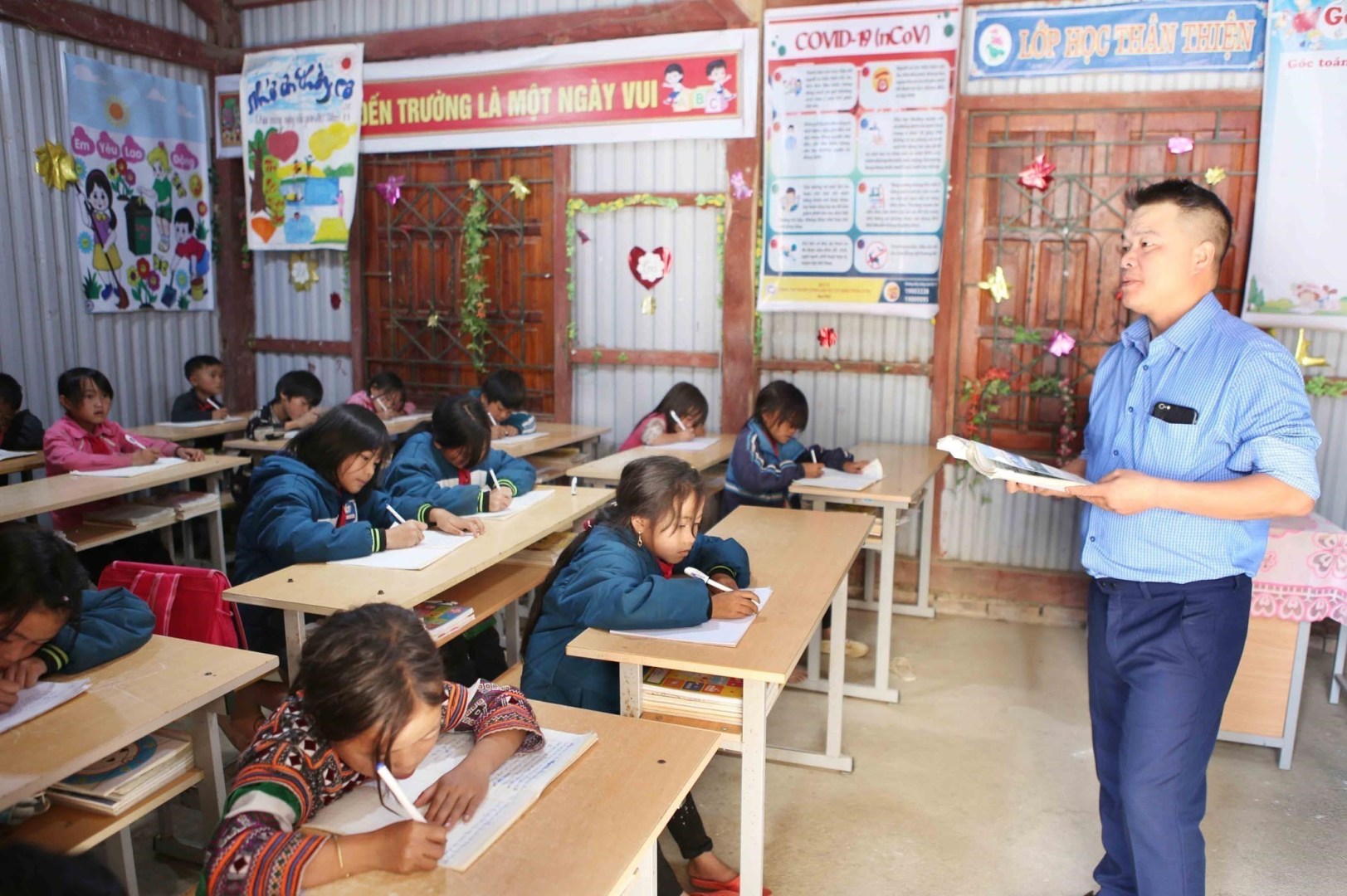
Creating sustainable livelihood for ethnic minority residents to help them get out of poverty is also the consistent policy of Vietnam, which has produced major achievements.
Statistics show that the household poverty rate dropped from 58.1% in 1993 to 2.75% in 2020 under new criteria.
During 2016 – 2020, though Vietnam encountered many natural disasters and disease outbreaks, especially the COVID-19 pandemic, the National Assembly and Government still doubled investment in poverty reduction compared to the previous period.
Nearly 1.7 trillion VND was spent on poor and disadvantaged districts and communes in the Northwest, Central Highlands and Southwest regions in the reviewed period.
More attention has also been paid to ethnic minorities and mountainous areas as seen in the Prime Minister’s approval of the national target programme on socio-economic development in those areas for the 2021 – 2030 period in October 2021. The programme aims to reduce the rate of poor households by more than 3% per year, see more than 98% of five-year-old children attending school, and the rate of students at primary and secondary schools, and high schools being 97.95% and 60%, respectively.

Ethnic minority people enjoy the right to participate in the political system, state management, candidacy to the National Assembly, and the People’s Councils. The proportion of ethnic deputies among the total number of deputies has been on the rise, ranging from 15% and 17% over the past four National Assembly tenures.
In early 2022, the Government approved the national target programme on sustainable poverty reduction for the 2021-2025 period with total funding of at least 75 trillion VND, targeting to reduce the nationwide poverty rate by 1-1.5%, by over 3% among ethnic minority households, and by 4-4.5% in poor districts per year. The number of poor and near-poor households is expected to decrease by half by 2025.
Persons with disabilities in Vietnam have been also the subject to receive assistance from the Party and State, with PwD-related issues always mainstreamed in the national development framework.
Vietnam has about 7 million people with disabilities, accounting for 7.8% of the country’s population, of which 48% are women and 28.3% are children. About 87% of people with disabilities live in rural areas and still face difficulties and thus, need support from the State and society.
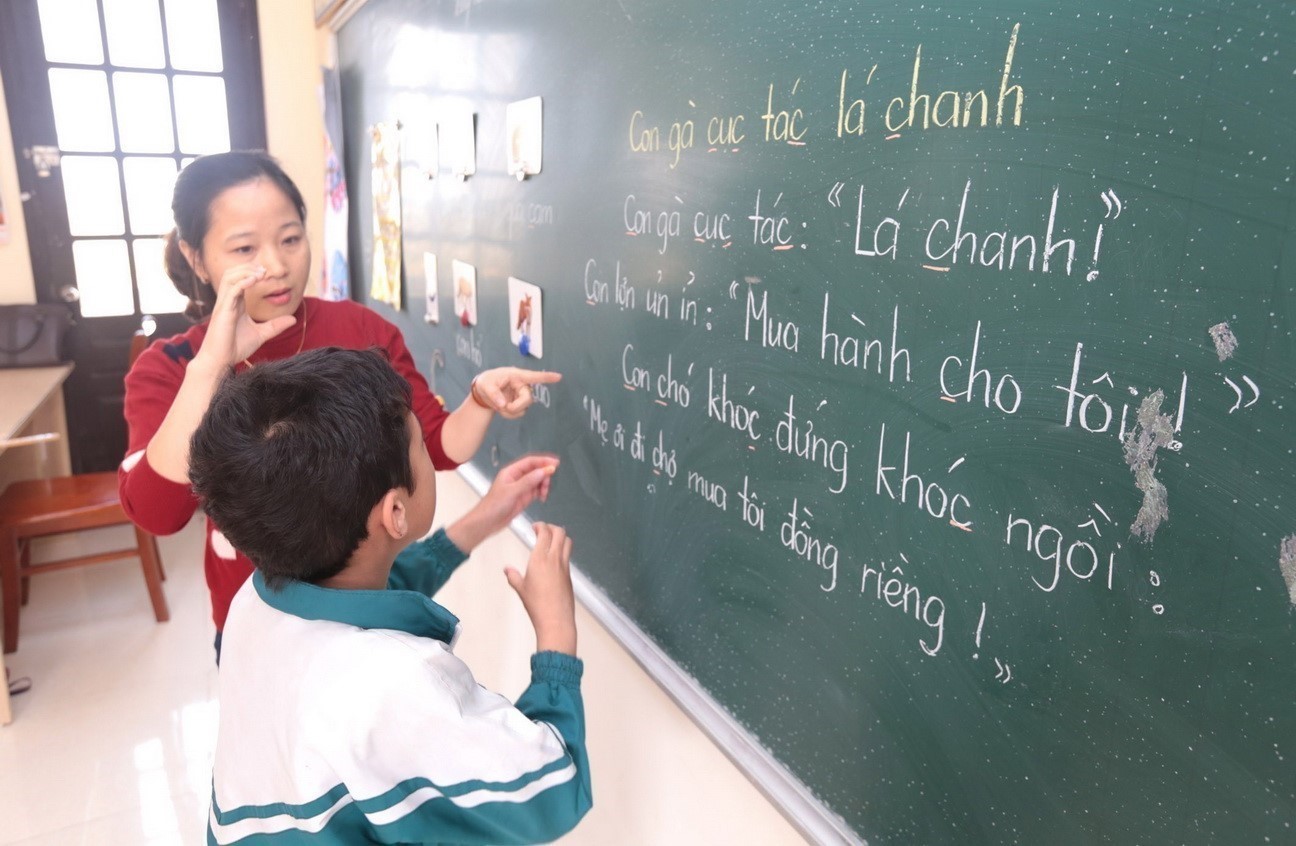
In addition to recognising and protecting the rights and obligations of PwDs like all other citizens, Vietnam always has given special priorities to this vulnerable group. The Government and National Assembly have made specific and practical policies and laws for PwDs, which creates favourable conditions for them to exercise their rights in politics, economy, culture, and society, to promote their ability to stabilise their lives, integrate into the community, and participate in social activities.
Under the national programme on PwDs for 2021 – 2030, millions of PwDs, including children, have received care at social protection establishments while all persons with special disabilities have been covered with health insurance.
The number of PwDs accessing support policies and programmes has kept increasing. To date, nearly 3 million of PwDs had their disability level assessed and received disability certificates. Over 1.1 million people with disabilities are receiving monthly social benefits.
In addition, Vietnam now has 63 rehabilitation hospitals and centres, all of its centrally-run general hospitals have rehabilitation departments, 90% of its provincial-level ones and 40% of provincial specialised hospitals have this kind of department. At the commune level of almost all localities, PwDs have their health records monitored and those with extremely severe disabilities are granted health insurance cards.
Besides, there are 20 educational and integration support centres, 107 special educational centres for disabled children, 256 training establishments for PwDs, and 400 PwD-owned businesses at present.

Vocational education and job creation for PwDs are also given much attention. In the period 2012-2022, about 17,000-20,000 people have received vocational training under the Vocational Training Scheme for rural workers each year.
Currently, 63 employment service centres nationwide provide consultation on vocational training and introduce job placement for about 20,000 disabled people yearly with a success rate of over 50%.
Preferential loans have been offered to PwDs, small and medium-sized enterprises, cooperatives, cooperative groups, and business households that employ a lot of PwDs.
From 2012 to 2020, nearly 39,000 people with disabilities got loans from the National Fund for Employment.
Speaking at the Celebration of the International Day of Persons with Disabilities (December 3, 1992-2022) and Forum “Listening to the voices of persons with disabilities” on December 1, 2022, Deputy Minister of Labour, Invalid and Social Affairs Nguyen Van Hoi said that besides care and support from the Party, State, Government, and the community, PwDs in Vietnam are always determined to overcome difficulties and challenges for a better life.
Hoi affirmed that in the coming years, Vietnam will continue to fully implement the provisions of the Constitution and the law on people with disabilities as well as international commitments in which Vietnam participates, including the review of the ten-year implementation of the Law on Persons with Disabilities.
On that basis, ministries and branches will study to amend, supplement and propose content related to people with disabilities to include in the Law on Social Insurance, and the Law on Employment following the conventions and with practice.

In addition, Vietnam’ efforts to ensure human rights during the pandemic were also demonstrated in the country’s drastic, synchronous and methodical implementation of the vaccine strategy, in which vaccine diplomacy plays the key role, heading to the goal of providing free-of-charge COVID-19 vaccination to all people.
With the engagement of the entire political system, huge efforts were made to bring Vietnamese citizens living, working and studying worldwide home amid the complicated development of COVID-19.
In a statement in February this year, spokesperson of the Foreign Ministry Le Thi Thu Hang affirmed the repatriation of Vietnamese people who were in extremely difficult circumstances abroad and wished to go home amid the COVID-19 pandemic is a sound and humane policy of the Party and the State.

According to the spokesperson, since the first flight carrying Vietnamese citizens in China’s Wuhan city back to Vietnam in early February 2020, more than 1,000 similar flights have been operated, repatriating about 240,000 Vietnamese from 60 countries and territories safely.
A survey conducted by Latana research firm on people’s satisfaction with their government’s response to the COVID-19 pandemic showed that 96% of Vietnamese people are satisfied with the Government’s COVID-19 prevention and control activities.
Recognition from international community
Vietnam’s joining the UN Human Rights Council for the 2023-2025 term has been the strongest affirmation of the country’s high sense of responsibility and willingness to make more contributions to human rights protection and promotion in the world. The country’s tireless efforts in the work have been widely recognised by the international community.

Right after Vietnam was elected to the council, UN Secretary-General Antonio Guterres expressed his belief that Vietnam will maintain active and effective contributions to the promotion and protection of human rights.
He affirmed that Vietnam is one of the indispensable members of the UN, and the country has and will make meaningful contributions to the common work of the UN in solving global challenges, for peace and development in the world.
“Vietnam’s election to the UNHRC for the period 2023-2025 presents a great responsibility but also an important opportunity to redouble efforts in protecting and promoting economic, social, cultural, civil and political rights in line with international human rights standards.”
UN Resident Coordinator in Vietnam Pauline Tamesis
In her article titled “Dignity, Freedom and Justice for All” on the occasion of Human Rights Day (December 10), UN Resident Coordinator in Vietnam Pauline Tamesis stated that 2022 marks the 45th anniversary of Vietnam’s membership to the UN, citing UN Secretary General Antonio Guterres as saying during his recent visit that upholding human rights in all its dimensions remain vital to the next chapter of Vietnam’s development success story.
According to Tamesis, Vietnam’s election to the UNHRC for the period 2023-2025 presents a great responsibility but also an important opportunity to redouble efforts in protecting and promoting economic, social, cultural, civil and political rights in line with international human rights standards.

Among Vietnam’s pledges as part of its election to the UNHRC, it is encouraging that the country prioritised upholding its commitments and obligations under the international human rights treaties, of which Vietnam has ratified seven out of nine, strengthening education on human rights, and addressing the impacts of climate change on the enjoyment of human rights, with particular attention on the rights of vulnerable groups, she wrote.
Meanwhile, Thai Ambassador to Vietnam Nikorndej Balankura said that Vietnam’s role in the international organisation as a whole has been very commendable. In the past years, Vietnam has successfully performed the role of a member of the UN Security Council and had represented the Asia region and Southeast Asia in particular very well.

The fact that Vietnam has been elected to the UNHRC is both commendable and well deserved. Vietnam is an ASEAN candidature so Vietnam’s candidacy has been supported by both ASEAN and of course, including Thailand. It’s a successful second election, not the first one. So it’s even more pronounced the success of Vietnam. Joining the council will strengthen the Vietnamese human rights record, advancing the protection and promotion of human rights, he held.
Indian Ambassador to Vietnam Sandeep Arya expressed his delight that Vietnam is in the council, affirming that India supported Vietnam’s candidature, and looks forward to Vietnam being a part of the council.
Philippine Ambassador to Vietnam Meynardo Los Banos Montealegre said that “the Philippines congratulates Vietnam for its election to the UNHRC for the term 2023-2025. The Philippines extended unilateral support to Vietnam’s candidate to the Council, which undoubtedly reflects our confidence to Vietnam’s important role in achieving and protecting universal human rights.”
New Zealand Ambassador to Vietnam Tredene Dobsoncongratulated Vietnam for its election to the UNHRC, emphasising that it’s such an important role at such a critical time.
“Vietnam is very well known for its contribution to international peace and security”, he said, noting that Vietnam has shown increased support for international peacekeeping operations.
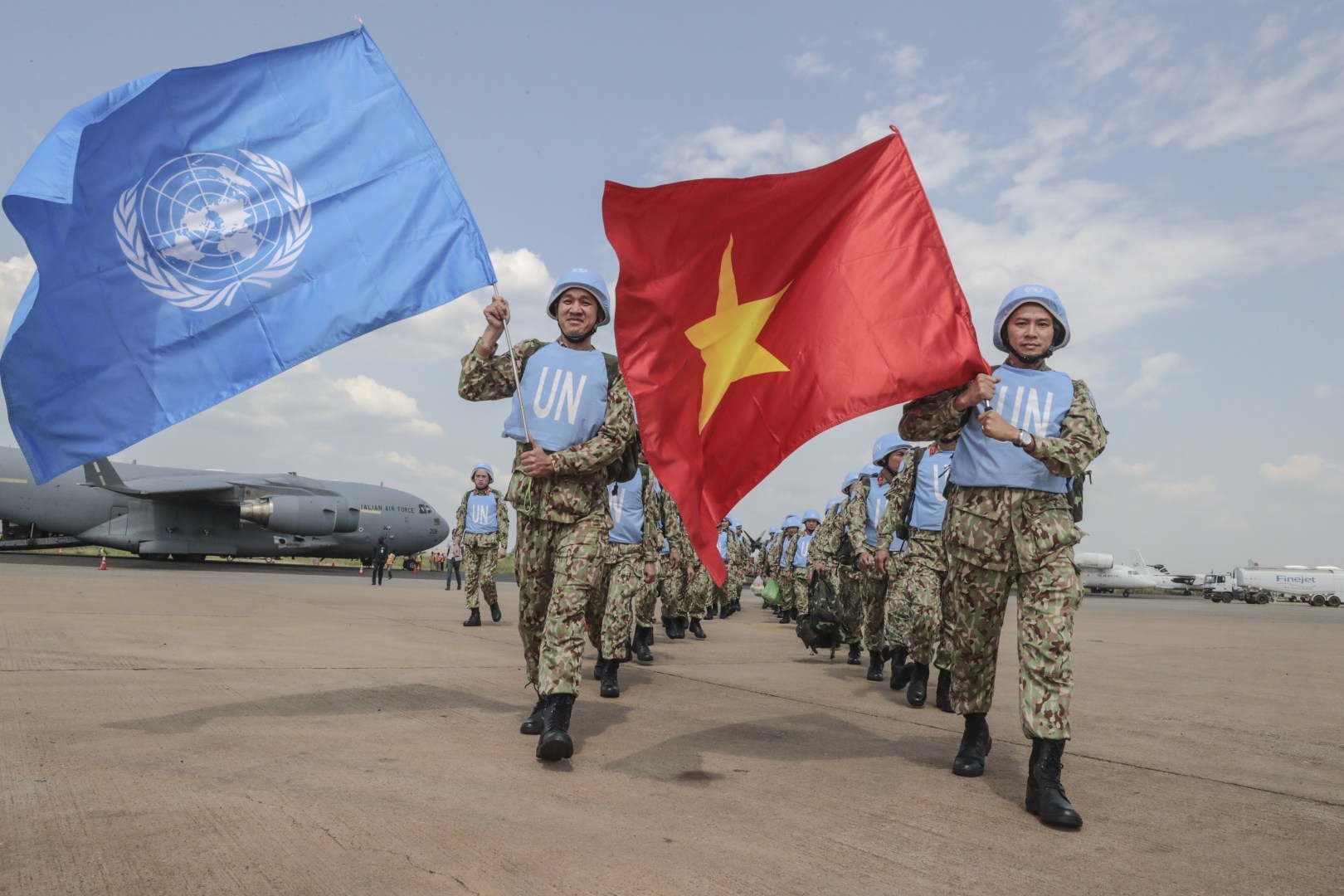
Domestically, Vietnam has shown that with strong policy dedicated towards economic development, the country can ensure and support people’s economic, cultural and social rights, he held, expressing his hope that Vietnam will bring that experience to the council.
At the same time, Australian Ambassador to Vietnam Andrew Goledzinowski said that Australia looks forward to Vietnam’s using its vote and influence as a Council member to promote a strong multilateral human rights system and to advance human rights globally. It is a heavy responsibility.
Human rights is an important area of bilateral engagement between Vietnam and Australia, he said, showing his hope to learn more about Vietnam’s priorities and objectives for its term on the Human Rights Council, as well as exchanging views on how both Vietnam and Australia can strengthen their engagement with the international human rights system during their bilateral Human Rights Dialogue early next year.
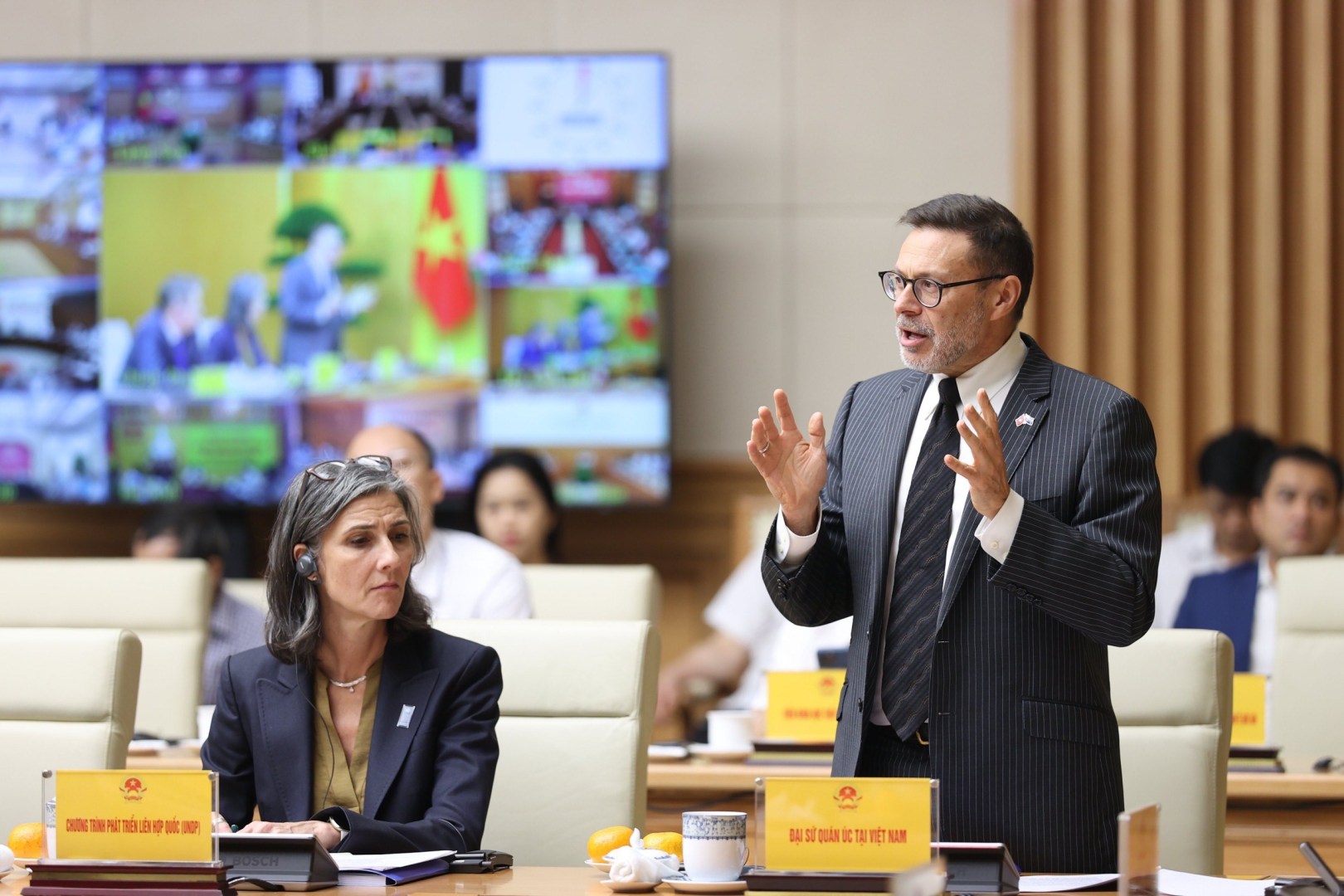
(Source: Australian Embassy in Vietnam)
He also highlighted Vietnam’s strong engagement in relevant multilateral human rights bodies and processes, including the Universal Periodic Review and UN Special Rapporteur.
Speaking to the press right after Vietnam’s election to the council, Foreign Minister Bui Thanh Son said that Vietnam today enjoys a new national posture and strength after thirty-five years of Doi Moi with sound policies and position, and experience accumulated since its previous terms as a member of the UNSC and the UNHRC. This lays a very important foundation for Vietnam’s confidence in performing its mandate at the UNHRC for 2023-2025.
As a reliable partner, and an active and responsible member, Vietnam will continue to work closely with fellow member states and make substantial contributions to the common work of the UNHRC. These include advancing dialogue and international cooperation in the spirit of mutual respect and understanding, and promoting human rights taking into account the particular conditions and legitimate needs and interests of countries, especially developing countries, he said.
“We will join hands with other member states to advance initiatives and solutions for the right to live in peace, right to development, rights of vulnerable groups, gender equality, right to access to healthcare, education and employment, and response to climate change and epidemics, among many others. In its 2023-2025 term, Vietnam will perform its reporting obligation under the 4th Cycle of the Universal Periodic Review (UPR), and other international conventions on promoting civil and political rights, fighting discrimination, and championing the rights of women and persons with disabilities,” the FM stated.
Although many difficulties and challenges are forecast for 2023 and following years, ensuring and promoting human rights will continue to be a focal point of Vietnam during the country’s path towards inclusive development with no one left behind./.

